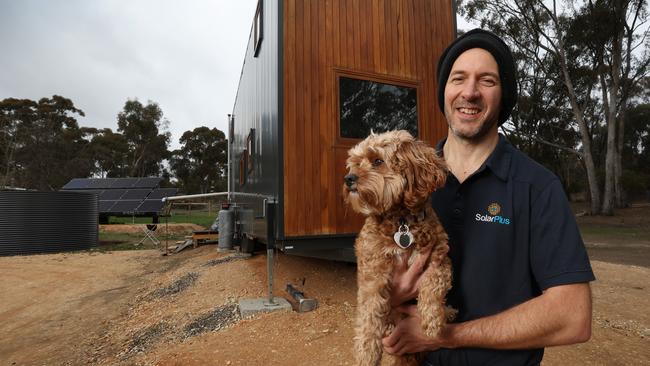More Aussies generating own power as cost of living bites
As the cost of power bills started to rise, Luke Shavak moved his family into a tiny house in Castlemaine to live completely off-grid. And the savings to his hip pocket are staggering.
News
Don't miss out on the headlines from News. Followed categories will be added to My News.
Individuals and businesses around Australia are increasingly turning to “off-grid” solutions to save money and become self-sufficient.
Castlemaine man Luke Shavak lives in a prefab ‘tiny house’ with his wife and two daughters, along with dog Daisy.
The Shavaks are dependent on nothing but mother nature, and a few solar panels, for the vast bulk of their energy needs.
Water comes from collected rainwater, wood for the burner from trees Mr Shavak chops with his trusty axe and chainsaw, and there is even a compost toilet which doesn’t require flushing.

For Mr Shavak, not being reliant on utilities providers has one major benefit.
“We just want control,” Mr Shavak said.
“Control over power, water and just (to) have nothing to do with any big retailer at all.
“We’re fully self-sufficient … obviously it’s cheap as well.”
Average energy prices in Victoria have risen by between 20 and 25 per cent in the last two years.
Mr Shavak said the economic benefits of the way he has chosen to live were laid bare when he received the water bill for another property he owned.
“I do have a place in Bendigo that we Airbnb and the water bill the other day was $300 for a quarter I think, and we barely use it,” he said.
“So obviously prices are going up as well (and we’re) just kind of protecting ourselves a bit.”
“If there’s a blackout in town we don’t even notice it, we wouldn’t even know.”

Mr Shavak said more and more of his social circle were turning to tiny houses – defined as movable dwellings up to 50sq m – and off-grid living as the price of essential utilities and goods increased.
“We have a lot of friends, they’ve got good jobs and they’re looking at the economy and where things are headed,” he said.
“They’re building tiny houses as well, a lot of friends that we never expected (would do) that.”
The movement away from traditional ways of getting power and other utilities is not limited to households.
Laurie Kane, Managing Director of solar software company SolarPlus, said there had been a fourfold increase in commercial off-grid quotes generated using his company’s software.
“Over the past four years, we’ve seen a 441 per cent increase in commercial off-grid quotes generated in the SolarPlus software by Australian installers alone,” Mr Kane said.
“This growth has come from more businesses seeking cheaper land in regional areas, but finding themselves facing excessive connection fees, expensive electricity rates and an unstable supply of power.”
“For many of these businesses, it’s just too great of a risk.”


